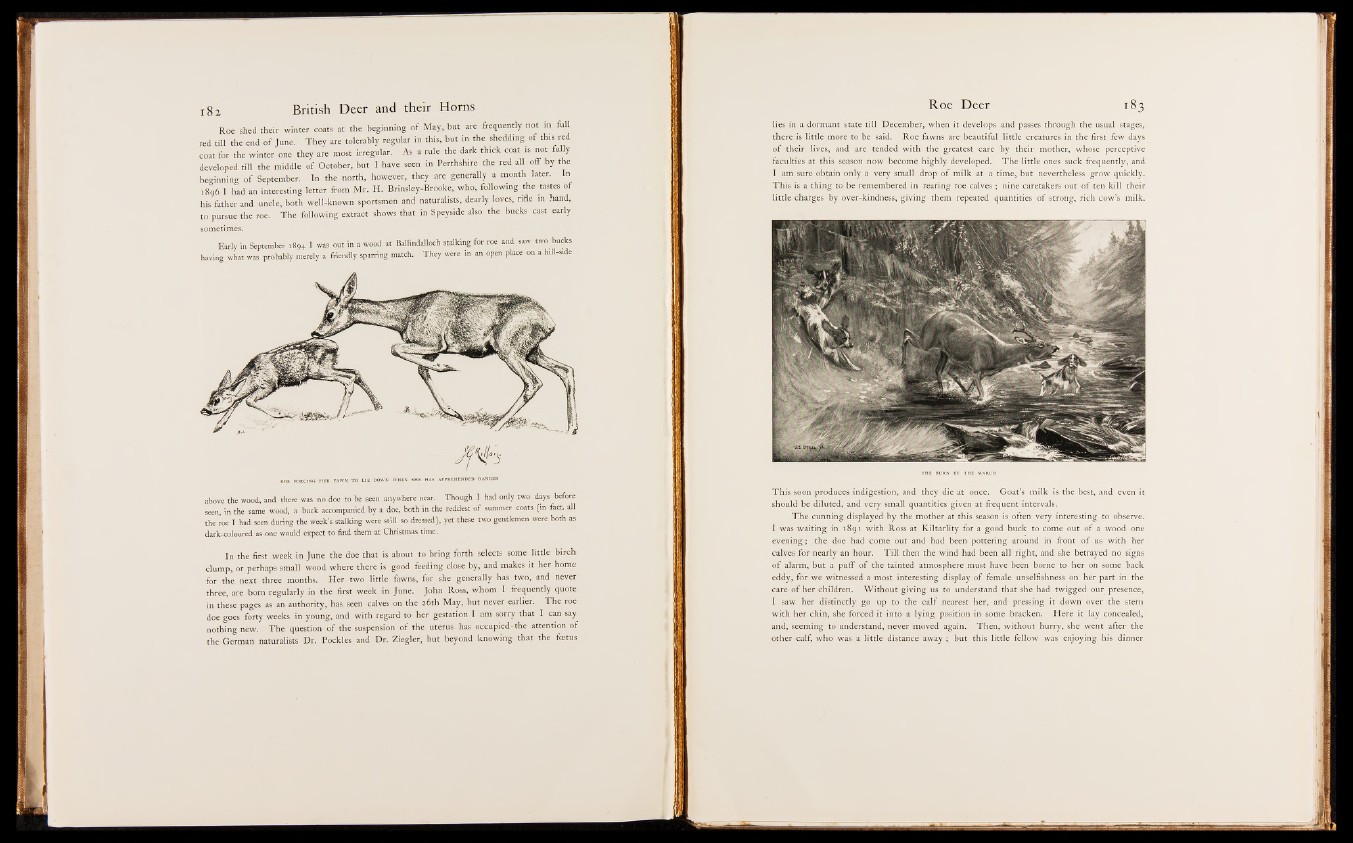
Roe shed their winter coats at the beginning of May, but are frequently not in full
red till the end o f June. They are tolerably Regular in this, but in the shedding o f this red
coat for the winter one they are most irregular. As a rule the dark thick coat is not folly
developed till the middle of October, but I have seen in Perthshire the red all off by the
beginning o f September. In the north, however, they are generally a month later. In
1896 I had an interesting letter from Mr. H. Brinsley-Bropke, who, following the
his father and uncle, both well-known sportsmen and naturalists, dearly loves, rifle in hand,
to pursue the rcief The following extract shows that in Speyside also the bucks cast early
sometimes.
Early in September 1894 I was out in a wood at Ballindalloch stalking for roe and saw two bucks
having what was probably merely a friendly sparring match. They were in an open place on a hill-side
above the wood, and there was no doe to be seen anywhere near. Though I had only two days before
seen, in the same wood, a buck accompanied by a doe, both in the reddest of summer coats (in fact, all
the roe I had seen during the week’s stalking were still so dressed), yet these two gentlemen were both as
dark-coloured as one would expect to find them at Christmas time.
In the first week in June the doe that is about to bring forth selects some little birch
clump, or perhaps small wood where there is good feeding close by, and makes it her home
for the next three months. Her two little fawns, for she generally has two, and never
three, are born regularly in the first week in June. John Ross, whom I frequently quote
in these pages as an authority, has seen calves on the 26th May, but never earlier. T h e roe
doe goes forty weeks in young, and with regard to her gestation I am sorry that I can say
nothing new. The question o f the suspension o f the uterus has occupied-the attention of
the German naturalists Dr. Pockles and Dr. Ziegler, but beyond knowing that the foetus
lies in a dormant state till December, when it develops and passes through the usual stages,
there is little more to be said. Roe fawns are beautiful little creatures in the first few days
o f their lives, and are tended with the greatest care by their mother, whose perceptive
faculties at this season now become highly developed. The little ones suck frequently, and
I am sure obtain only a very small drop o f milk at a time, but nevertheless grow quickly.
This is a thing to be remembered in rearing roe calves ; nine caretakers out o f ten kill their
little charges by over-kindness, giving them repeated quantities of strong, rich cow’s milk.
This soon produces indigestion, and they die at once. Goat’s milk is the best, and even it
should be diluted, and very small quantities given at frequent intervals.
T h e cunning, displayed by the mother at this season is often very interesting to observe.
I was waiting in 1891 with Ross at Kiltarlity for a good buck to come out o f a wood one
evening; the doe had come out and had been pottering around in front o f us with her
calves for nearly an hour. T ill then the wind had been all right, and she betrayed no signs
o f alarm, but a puff o f the tainted atmosphere must have been borne to her on some back
eddy, for we witnessed a most interesting display o f female unselfishness on her part in the
care o f her children. Without giving us to understand that she had twigged our presence,
I saw her distinctly go up to the calf nearest her, and pressing it down over the stern
with her chin, she forced it into a lying position in some bracken. Here it lay concealed,
and, seeming to understand, never moved again. Then, without hurry, she went after the
other calf, who was a little distance away ; but this little fellow was enjoying his dinner